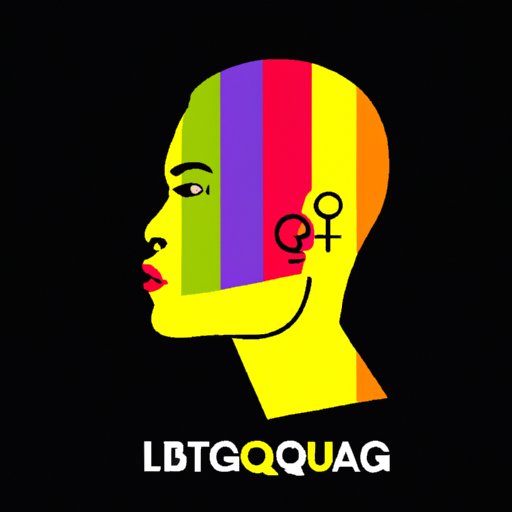
Introduction
Homosexuality has long been a topic of debate and controversy, especially concerning its classification as a mental disorder. Many still argue that being gay, lesbian, or bisexual is a form of illness that requires medical intervention or so-called “conversion therapy.” In this article, we will explore the historical, scientific, social, and ethical implications of this classification and its impact on the mental health of LGBTQ+ individuals.
Historical Analysis of Homosexuality as a Mental Disorder
The history of homosexuality being classified as a mental disorder is a long and complicated one. In 1952, the American Psychiatric Association (APA) classified homosexuality as a sociopathic personality disturbance in the Diagnostic and Statistical Manual of Mental Disorders (DSM). This classification was revised in 1968, and homosexuality was classified as a sexual deviation. It wasn’t until 1973 that the APA removed homosexuality as a mental disorder from the DSM-II.
Despite this change, the perception that homosexuality was a mental disorder persisted for many years. This classification had a significant impact on the treatment of LGBTQ+ individuals, leading to harmful and ineffective interventions such as conversion therapy. Even today, many people still use the incorrect and stigmatizing notion that being LGBTQ+ is a mental health condition that needs treatment.
Personal Story of Discrimination
It’s one thing to talk about the history and the impact of such classification, but it’s another thing to hear the stories of LGBTQ+ people who have suffered greatly because of it.
For example, take the story of a young gay man named James. Growing up in a conservative family, James struggled with his sexuality, feeling as though something was wrong with him. Trying to fit in, he sought therapy to “cure” himself of his “disorder.”
But the therapy was traumatic, and, even after he realized that he couldn’t be “fixed,” James was left with severe anxiety and depression. For many LGBTQ+ people like James, the mental health consequences of being stigmatized and discriminated can be severe and long-lasting.
Scientific Evidence
Despite the harmful classification of homosexuality as a mental disorder, there is ample scientific evidence that supports the idea that being LGBTQ+ is not a disorder. Many leading professional organizations, such as the American Psychological Association, the World Health Organization, and the International Classification of Diseases, no longer consider homosexuality a mental illness.
Research shows that people’s sexual orientations are an inherent aspect of their identities, not a choice or a pathology. Therefore, the idea that being LGBTQ+ is a mental disorder is not only scientifically flawed but also stigmatizing.
Social and Cultural Factors
The social and cultural factors surrounding homosexuality and mental health are complex and multifaceted. Societal norms, gender roles, religion, and political ideologies influence how society views and treats LGBTQ+ individuals.
For example, in many conservative societies, LGBTQ+ individuals face severe discrimination in the form of legal penalties, violence, and social exclusion. This discrimination, in turn, contributes to mental health issues such as depression, anxiety, and substance abuse.
Ethical Implications
Moreover, the classification of homosexuality as a mental disorder raises serious ethical concerns. By labeling being LGBTQ+ as a mental illness, clinicians may unintentionally pathologize individuals struggling with their identity, leaving them feeling alienated, misunderstood, and even demonized.
This classification also encourages harmful practices such as conversion therapy, which have been widely discredited in the mental health field and condemned by many professional organizations. Conversion therapy, or reparative therapy, is a pseudoscientific practice designed to change a person’s sexual orientation or gender identity to a more heterosexual or cisgender norm.
Decriminalization and Destigmatization
Despite the many challenges faced by the LGBTQ+ community, much progress has been made towards destigmatization and decriminalization. In many countries, laws have been enacted to protect LGBTQ+ individuals from discrimination and hate crimes. Marriage equality has been established, and many religious institutions are gradually shifting their attitudes towards inclusion and acceptance.
These changes are essential not only for the legal and social recognition of LGBTQ+ people but also for their mental health. Research has shown that social support, acceptance, and affirmation of one’s identity are critical protective factors against mental health issues in LGBTQ+ people.
Conclusion
Homosexuality is not a mental disorder, and it never was. However, the perception that being LGBTQ+ is a form of illness still persists in many parts of the world today. Stigmatization and discrimination can have severe and long-lasting effects on the mental health and well-being of LGBTQ+ individuals.
It’s essential to understand the historical, scientific, social, and ethical implications of this classification of homosexuality and work towards creating a more inclusive and affirming society for LGBTQ+ individuals. As allies, we can support destigmatization efforts, act as advocates for ethical mental health practices, and fight for the rights of all LGBTQ+ people to lead fulfilling lives free from discrimination and prejudice.





